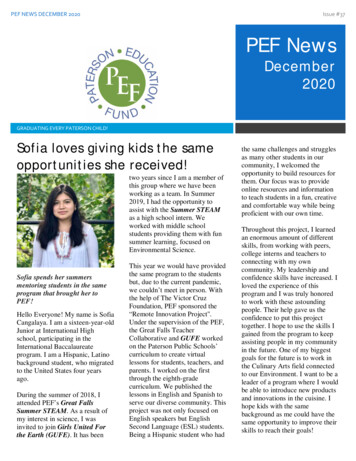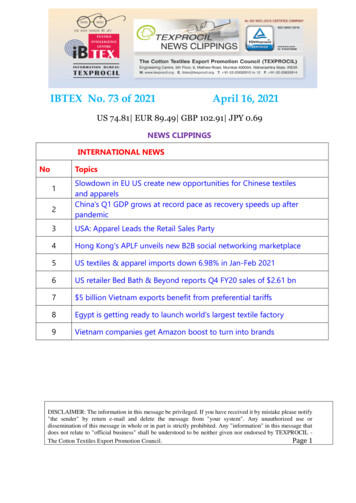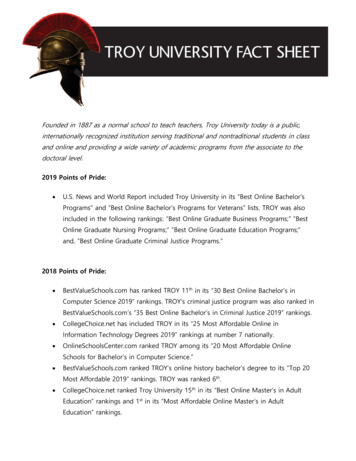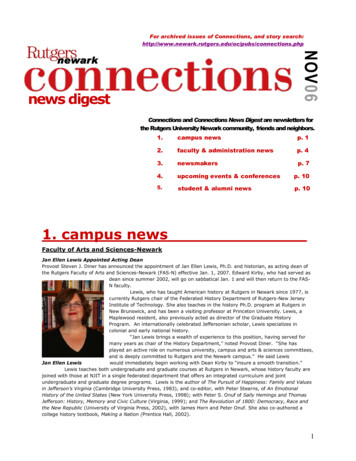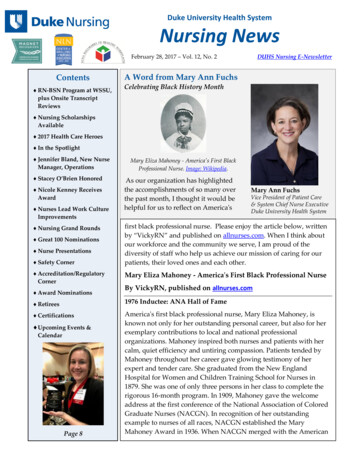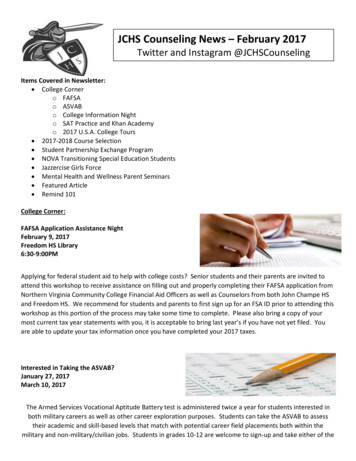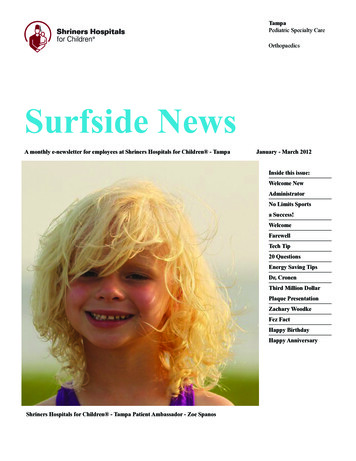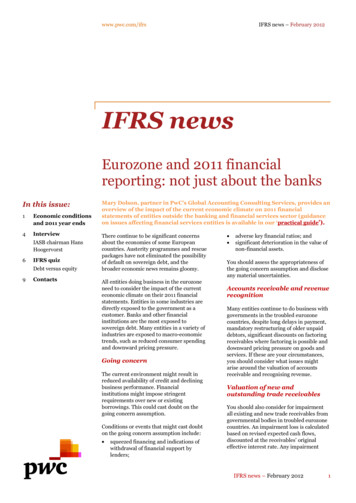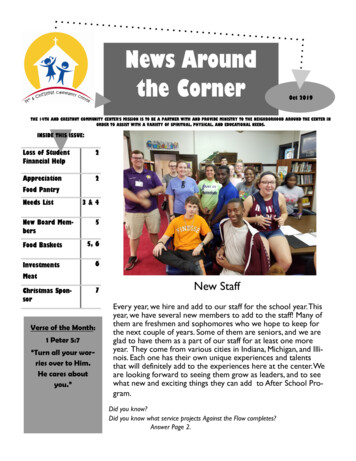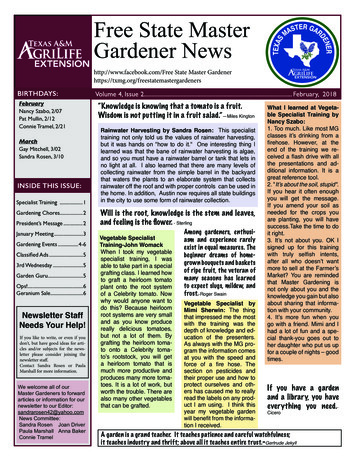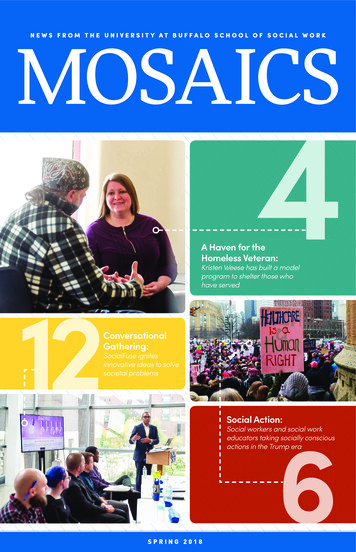
Transcription
NEWS FROM THE UNIVERSITY AT BUFFALO SCHOOL OF SOCIAL WORK4A Haven for theHomeless Veteran:12Kristen Weese has built a modelprogram to shelter those whohave servedConversationalGathering:SocialFuse ignitesinnovative ideas to solvesocietal problems6Social Action:Social workers and social workeducators taking socially consciousactions in the Trump eraSPRING 2018
News SCHOOLof theCOMINGS& GOINGSAshley Allen joined UBSSW in the Fall 2017 as our academicprocesses coordinator. Allen was at SUNY Buffalo State Collegefor 10 years, where her most recent title was coordinator formandated programs.After 17 years with UBSSW, Zoe Koston retired as senior fieldeducation coordinator. She’ll generously continue to serve as adonor and volunteer, and for that we thank her.Barbara Rittner, associate professor, who joined the faculty in1993, has retired—her teaching duties will curtail after this summer.During her UBSSW career, she assumed many responsibilities,including PhD program director, associate dean for advancement,and generous donor.Laura Shrader, student services advisor since 2013, has accepteda position as an instructional designer at SUNY Fredonia, in theirexpanding online programs.Clinical Associate Professor Charles Syms retired after 22 yearswith the school; he will continue to teach here part-time. Syms hasour eternal respect for his expert knowledge on addictions, andhis leadership with interprofessional education, especially at theLighthouse Medical Clinic.STUDENT NEWSCongratulations to MSW/MPH student Kailey Lopian, whowas selected to Substance Abuse and Mental Health ServicesAdministration’s prestigious Minority Fellowship Program – Youth.Students have founded a UBSSW chapter of the Macro Social WorkStudent Network, to advance education about and involvement inmacro issues and/or macro social work practice, an importantelement regardless of one’s current practice or focus. Studentsand faculty are welcome. For information on future events, contactTemitope Oke (Temi) at toke@buffalo.edu.EXPERT VISITORDr. Wynne Korr (PhD ’75 & BS ’70) tackled some weightytopics when she visited her alma mater in November, 2017.At UB to accept a Distinguished Alumni award, she gave atalk to School of Social Work faculty on the future of socialwork education. Dean Nancy Smyth warmly welcomedKorr, former dean of the University of Illinois School ofSocial Work.A nationally recognized voice regarding social innovationand entrepreneurship, Korr spoke to faculty for over anhour, taking questions and getting a few laughs.Pointing out that social workers educated today will still be practicing in 2060, Korr said thatsocial work educators must ask themselves what these students need to know to sustainthem—such essentials as social work’s goals and the nature of its services should continueto be considered, she posited.Citing a missed opportunity, Korr lamented the fact that social welfare issues are notincluded in the general education curriculum.In social work education, preparing students for the practice environment, consideringshifts in service delivery models, and funding sources are all critical, she said. A socialentrepreneurial mindset, the tension between micro and macro, ensuring that students feelthat they’ve achieved competency—all were touched upon, and acknowledged to be partof the ongoing conversation.F A C U LT YACHIEVEMENTSHilary Weaver is the recipient of the 2017 American IndianElder Award from the Indigenous and Tribal Social WorkEducators’ Association. She is the youngest person to receivethe award, and also one of the only recipients still activelyteaching. The award recognizes her lifelong contributionsto promoting American Indians in social work education.Melanie Sage, who joined the faculty this year (see p. 10 fora brief profile), has received a 2.4 million U.S. Departmentof Health and Human Services grant, which she will useto continue research begun at the University of NorthDakota, where she was first awarded the grant. She is thelead researcher on the five-year project; it’s committed togathering evidence and producing resources to improvethe services that state agencies offer to Native Americanchildren and families involved in child welfare cases, inaccordance with the Indian Child Welfare Act (ICWA).She hopes an interdisciplinary approach, pulling togetherthe many involved parties, will improve communicationbetween systems in these proceedings.NEW PROGRAMFROM THE OFFICE OF CONTINUING EDUCATIONSocial Work Practice Fellows, debuting this fall, is a premier36-hour certificate program for social work supervisorsfeaturing an advanced and sophisticated curriculum—thecontent focuses on the many complex issues that challengeMSW supervisors. The program, part of a multi-site initiativecoordinated by two Adelphi University faculty, is supportedby the Florence V. Burden Foundation and the HealthFoundation for Western & Central New York. Visit tinyurl.com/SWPFfall2018 for details.GLOBAL & CIVICENGAGEMENTWith strong hopes for more major funding, a project that couldhave long and wide ranging effects in Haiti is working towardscreating a sustainable village and learning community in theArcahaie region.SUNY is a leader in the project, with participation from tencampuses and many disciplines. In addition, a group ofnonprofits is participating. The project was incepted after Dr.Carmelle Bellefleur, a Nassau Community College professoremerita and Haitian native, donated land to create the village.The W.K. Kellogg Foundation is providing initial funding.Laura Lewis, School of Social Work assistant dean for globalpartnerships and director of field education, along withAssociate Professors Filomena Critelli and Kelly Patterson,is leading UB’s participation. One of the project’s goals is toavoid acknowledged challenges of successfully working inHaiti—an extremely impoverished society with systemic andrampant inequity.The long-term goals for SUNY schools involved includeconnecting faculty with international projects, and fosteringclassroom collaborations. “Part of this project is bringingHaitian social work students and faculty together online withour faculty and students,” said Lewis.
FROM DEAN NANCY J. SMYTHOn many different fronts, these are more challenging timesthan I can recall. In the past, we’ve all had to respond tofederal policy changes negatively affecting some vulnerablepopulations, but now we have an onslaught of policychanges affecting many, fueled by a divisive administrationand people making all sorts of ill-informed, inflammatorycomments. This nation is badly in need of a more civildiscourse.As a profession, we are very concerned about current andproposed policy changes, as well as the national dialoguearound issues of race, gender, sexual orientation, religion,immigration, and sexual assault and harassment. Simplystated, this is a great opportunity to take social action inmany concrete ways and to make our voices known.In this context, the big challenge for us, as educators in aprofession rooted in social justice, is to teach and championour values while ensuring that we are supporting people’sfreedom of speech, acknowledging that there are differentperspectives on solving a problem.Last summer, a group of our faculty went to Michigan tolearn more about facilitating successful intergroup dialogue across differences—that is, among individuals whohave very different points of view, especially on “hot” issues. How does one encourage a conversation among peoplewho fervently disagree, in a way that actually promotes meaningful dialogue? Our faculty work hard on this in theclassroom every day.Social work has a solution-focused perspective. We look for and work toward positive changes, rather than merelyobjecting to the negative. That’s also part of the challenge for us at this time: because so much change is beingproposed so quickly, it is easy to become overwhelmed. We need to ensure we target the right level of government,oppose the changes that would be hurtful, propose effective alternatives, and include everyone’s voice. We can’t doall of this for every problem—each of us needs to make decisions about where to put our focus. However, we canbuild coalitions, and support others’ efforts, to ensure that many topics are being addressed.There are stories in this issue about social action activities by students, faculty and alumni such as Kristen Weese’snotable work helping homeless veterans find their way back. Hearing these stories, in the face of such challengingtimes, gives me hope for our future. I hope you feel the same way after reading them.NANCY J. SMYTH, PHD, LCSWMosaics, the newsletter of the UB School of Social Work, is produced twice a year. April, 2018.Volume 12, Number 2.Non-traditionalsocial work careersare HOT!Let us know how you’re using yoursocial work training and skills insurprising or unusual ways—whatfield are you in, and how does it apply?Email us at sw-mosaics@buffalo.eduThe University at Buffalo is a premier research-intensive public university, the largest and mostcomprehensive campus in the State University of New York. UB’s more than 30,000 students pursuetheir academic interests through more than 390 undergraduate, graduate and professionaldegree programs. Founded in 1846, the University at Buffalo is a member of the Association ofAmerican Universities.EDITORIALMaureen HammettVice Dean/Chief of StaffSarah J. WatsonCommunications Officer and Senior Project ManagerJana EisenbergEditor/Contributing WriterDaniel CalabreseGraduate AssistantDESIGNLibby PfonnerOnion Studio, Inc.PHOTOGRAPHYDylan BuyskesOnion Studio, Inc.Cover photo (Women’s March): Alexis OltmerElectronic versions of this publication may be found at socialwork.buffalo.edu/mosaics.Correspondence, including requests to be added to or removed from the mailing list, andclassnotes submissions, may be sent to: Editor, Mosaics, University at Buffalo, School of SocialWork, 685 Baldy Hall, Buffalo, NY 14260; or email sw-mosiacs@buffalo.edu.2&3
A haven for theHOMELESSVETERANKRISTEN WEESE HAS BUILT A MODEL PROGRAMTO SHELTER THOSE WHO HAVE SERVED by Jim BiscoBecause her father, grandfather andfather-in-law all served in the armedforces, Kristen Weese, BA/MSW ’02, LCSW,knows what it means for them to have hadwelcoming homes with their families. And, whenshe had a chance to help veterans who did nothave those basic comforts due to mental health,substance abuse or other issues, she embracedthe opportunity.“I can’t think of any better cause than servingthose who have served this great nation,” shesaid. “My life and career experience has givenme a very specific skill set to be able to assistthis population.”Together with the support of her team of socialworkers, most of whom are SSW alumni, andmultiple SSW interns, Weese helps homelessveterans and their families throughout WesternNew York find sustenance, homes, jobs,education, and their dignity. She accomplishesthis through a program that has become a modelfor the VA network in eliminating bureaucraticbarriers to provide immediate assistance.ADDRESSINGTHE PROBLEMWeese’s career in social work spans 15 years,encompassing mental health and substanceabuse counseling, and medical social work.Since 2009, she has dedicated her career toHealth Care for Homeless Veterans (HCHV)at the Veterans Affairs Western New YorkHealthcare System (VAWNYHS), first servingas a Department of Housing and UrbanDevelopment VA Supportive Housing (HUDVASH) case manager before becoming HCHVprogram manager in 2013.“I directly oversee programs which offeremergency, transitional, and permanenthousing to homeless veterans and their families,”she said. “We also have an HPACT (HomelessPatient Aligned Care Team), a medical clinic forveterans in our program. In addition, we providean outreach component; we go into localcommunity shelters or to the street—we mightget a phone call that someone appears to bea homeless veteran; maybe they’re wearing aVietnam War veteran hat, sleeping in the woods.We go out and find them.”The HCHV program helps about 1,600 veteransa year. The resources were slim when Weesebegan her VA career—she was one of only sixstaff members. In 2014, then-First Lady MichelleObama challenged U.S. mayors to dedicate theircommunities to ending veteran homelessness.Programs were added as funding increasedand the challenge benchmarks began to be met.Now Weese oversees a team of 20, including 14social workers, 11 of whom are SSW alumni.In October 2016, the United States InteragencyCouncil on Homelessness, HUD, and theDepartment of Veterans Affairs announcedthat VAWNYHS effectively ended homelessnessamong veterans in their catchment area.“I can’t think of anybetter cause thanserving those who haveserved this great nation.”- Kristen Weese“We’re very proud that we were among the firstto do that,” Weese stated. This catchment areacovers seven Western New York counties. Weesesaid that the designation means VA, togetherwith the community, has the infrastructure andthe resources to effectively and quickly house ahomeless veteran and his or her family.“‘Functional zero’ does not mean that there aren’tor won’t be homeless veterans,” she said. “Itmeans that solid community relationships havebeen built and together we have the resourcesto assist any homeless veteran.”CREATIVE SOLUTIONSWeese’s VA awards, both national and local,recognize the creative solutions and the effectiveresults that sustain the programs. She proudlypoints out that it is the work of a dedicated team.“We don’t look at problems and say, ‘we can’t dothat.’ It’s ‘how’; how can we fix this, what can wedo,” she said.In 2015 and 2017, Weese’s program wasrecognized as a best practice. For example,it used to take weeks or even months to getthrough the Section 8 rental assistance processbefore a veteran could even begin looking foran apartment. “We completely streamlined theprocess, eliminating red tape and barriers,” shesaid. “Now when a veteran comes in, if they don’talready have their required documentation, wecan get their birth certificates or discharge papersquickly from anywhere. We gather everythingthey need, and complete the public housingauthority paperwork. We’ve become specialistsin both filling it out and hand-delivering it, so thatveterans can get their rental assistance voucherwithin about a week.” Weese’s team created atoolkit with the different tools that they’ve used tospeed the process, and have shared those bestpractices with the VA nationally.Another nationwide problem that Weese’s teamaddressed was the ability to work with a veteranonce he or she is no longer homeless—to lookat the factors that may have contributed totheir homelessness in the first place and avoid ithappening again. “To address recidivism, we hadanother best practice in 2017, around our HUDand community partner relationships,” she said.“We were recognized for regular conferenceswith our public housing authority to addressany housing issues. We developed a template toteach other VAs how to work collaboratively withtheir public housing authority.”THE IMPORTANCE OFCASE MANAGEMENTWeese particularly values case management.“I’ve been a mental health and substanceabuse social worker. I’ve done home care. All ofthat gave me the tools that I needed to be aneffective case manager,” she attested. “If youdon’t meet the veteran’s basic needs of food andclothing, how are you going to work on what’smaking them depressed or anxious? You can’t.
“It’s practically immediate gratification—we’reable to almost instantly change a challengingsituation that a veteran may be in,” she continued.“There’s nothing more rewarding.”Weese credits her alma mater in part for theskill levels of her staff. “The UB School of SocialWork trained us very well to be able to manageall of the needs of every person—not just theveterans. We ‘case-manage’ the whole family,”she explained.“We’ve become experts on knowing how to dothings like get a homeless child enrolled in school,”she continued. “I’ve gone to school boards witha veteran and their child, and said ‘this child’shomeless, we need to enroll them.’ And theydid. We can get that child to a doctor. We haveresources to get children school supplies andChristmas presents.”EMBEDDED INTERNSWeese is particularly grateful for the work ofSSW interns. In fact, five of the SSW alumnijoined the staff after serving internships at theVA. Three MSW interns currently participatein street outreach and case management forthe veterans.“We give students a unique, hands-on perspectiveon social work,” relates Weese. “If a veteran isbeing evicted from his apartment for hoarding,we figure out a way to assist that veteran incleaning it up. If a veteran has lived in thewoods for several years and doesn’t know howto unclog a toilet, we teach him how to use aplunger. It’s basic stuff that most of us take forgranted. We really show the MSW students whatcase management is and what we can do associal workers.”“The interns are completely embedded in ourprogram, participating in every aspect. Theyeven helped plan our annual Thanksgivingdinner and holiday party for homeless veteransand their families,” she said.Weese and some of her staff and colleagues, many of whom started out as UBSSW interns and/or are alumni.(bottom, L to R) Stephanie Singer, MSW intern, Patrick Costello, Donna Leigh, MSW ‘02, David Silverheels, MSWintern, Thomas Szczygiel, Craig Voigt, MSW ‘03. (top. L to R) Allison O’Brien, MSW ‘06, Carolyn Vahoviak, KristenWeese, BA/MSW ‘02, Christopher Ramnauth, Patrick Herbst, Stephanie Anzalone, MSW ‘10, Cole Johnson, AliciaSholtz, MSW ‘10. Additional personnel (not pictured) include Karen Anderson, Christian Allport, Michael Balk,MSW ‘87, Edward Cooper, MSW ‘05, Michelle Duclos, MSW intern, Jeanne Heinl, MSW ‘10, Sean Lindstrom,Sophia Miller, MSW ‘85, Kevin Quiambao, MSW ‘13, Daniel Stegeman, MSW ‘09 and Russell Stewart, MSW ‘10.In keeping with the team’s need to be flexibleand uphold their “can do” attitude, the internsgot an even more unique (and modern) handson experience recently. During a temporaryrelocation of the walk-in health clinic forhomeless veterans, after their regular clinicflooded, they found themselves with no internet.Once armed with program-supplied iPads,the interns were able to continue to securelyprovide service for their clients, includingaccessing medical records, finding resources,and conducting virtual appointments.interns with the devices to be mobile andresponsive, while not interrupting the flow of ourwork,” Weese noted.In addition to her own team, Weese praises thelarger support from the administration. “Thehomeless program is a strong unit, and wehave a committed VA Medical Center as well.They give us the resources that we need,” shesummed up. “We also have a committed andpassionate community. We all work together toget the job done.”“With the School of Social Work’s emphasison appropriate use of technology for socialworkers, I was so glad we could provide our“‘Functional zero’ doesnot mean that therearen’t or won’t behomeless veterans,”Weese said. “It meansthat solid communityrelationships havebeen built andtogether we have theresources to assist anyhomeless veteran.”Health Care for Homeless Veterans providesessentials to veterans moving out ofhomelessness (all of which are donated tothe program), including personal care andhousehold items, as well as new clothingand bedding.4&5
Social workers and social work educators takingsocially conscious actionsTrump erain the
by Jana EisenbergIt is in the social work code of ethics thatsocial workers advocate for, defend, andwork towards positive change on behalfof vulnerable, discriminated-against anddisenfranchised people—namely, towards“social justice.”This means taking action—whether it’s professionally andon an individual level, personally, for example, going todemonstrations, or in daily practice, as a social work educator/researcher, student, or professional.In these complex and divisive t
36-hour certificate program for social work supervisors featuring an advanced and sophisticated curriculum—the content focuses on the many complex issues that challenge MSW supervisors. The program, part of a multi-site initiative coordinated by two Adelphi University faculty, is supported by the Florence V. Burden Foundation and the Health
